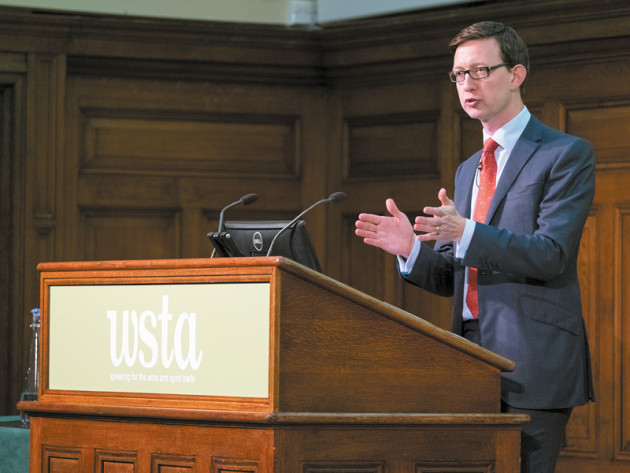
Unpicking the duty system
Now the dust has settled and the Chancellor has published proposals to change the UK alcohol taxation system, Miles Beale, chief executive of the Wine & Spirit Trade Association, picks apart the pros and cons of the suggested model.
There was much talk at the autumn Budget about making taxation of alcoholic products “simpler, fairer and healthier”. But government proposals have fallen short.
While generally simpler, the proposal for the new system is not simpler for wine and blatantly not fairer to the wine and spirit sector.
The government is proposing a system where all alcoholic drinks are taxed with reference to the litres of pure alcohol they contain. Currently, only beer and spirit drinks are taxed in this manner, while wine, made wine and cider are taxed by volume of finished product. Taxing all alcoholic drinks according to strength based on alcohol content would be fairer, provided the same rate per litre of pure alcohol were used. But this is not what the government has proposed.
While in general we support taxing all alcohol according to strength (and at the same rate), we noted in our previous submission to Treasury that this was neither practicable nor fair for wine. Rather than continue to tax wine by volume, we suggested the Treasury should tax all wine as if it were 12% abv and apply the standard rate.
But the government wants to introduce a system where, across all categories, products will be taxed in reference to the litres of pure alcohol they contain, and: “While generally simpler, the proposal for the new system is not simpler for wine and blatantly not fairer to the wine and spirit sector”.
Unpicking the duty system with escalating rates applied across a series of bands: 1.2-3.4% abv; 3.5-8.4% abv, 8.5-22% abv, and above 22% abv. So not all alcohol is equal.
The lowest rate reflects the government’s desire to tax lower-strength products at a lower rate. In the 3.5-8.5% abv band, where there is most competition between categories, the system becomes even more confused, introducing three separate rates for beer, cider, and wine & spirits
Here the government undermines its own aim of simplicity and fairness by reinforcing, rather than addressing and simplifying, the distortion of competition.
As with all these types of reviews, the devil is in the detail. There are anomalies that don’t fit with the government’s stated aims. If it wants to make things fairer and push consumers to make healthier choices, then per unit costs should be the same irrespective of the category of drink. It looks like a mistake to cut tax on high-strength, high-calorie beers and ciders and makes less sense to penalise still wines, some three-quarters of which will be taxed more yet are lower in calorie content.
These might be unintended consequences, which we will be highlighting as part of the consultation process (see box).
We welcome the reduction of the sparkling wine super-tax, which is long overdue. However, we are mystified by a proposal that embeds unfairness between products, with beer continuing to pay 19p a unit (or lower), cider and flavoured cider 9p, but wine increasing to 26p and spirits remaining at 29p.
The introduction of duty equivalence for wine and cider will distort the market: a 15% abv wine will pay 25% more duty than a wine at 12% abv and will be complicated to administer.
This effectively means the government is taxing sunshine. For winemakers in hotter countries, higher sugar content in the grapes means the wine is generally likely to have a slightly higher abv. A further complication is that abvs can change for wine from vintage to vintage, between destination and arrival or purchase and consumption.
Those who enjoy a G&T at home, under the government’s proposals, will pay 45p duty on a double G&T in a can, but if you pour a double gin and dilute with tonic you will pay 57p duty. The G&T in a can would in future be taxed in a new band where the rate is lower than for the unmixed gin 22%-plus band.
Rishi Sunak has effectively given lovers of high-strength beer a cut, thus undermining the government’s public health aims. The detail of the government’s proposals seems contradictory to the stated aims of revising the scheme, to iron out inequalities. In the end, it seem to have only introduced more.
Call for response
The WSTA is now calling on the trade to respond to the consultation on proposed changes to the alcohol taxation system in the UK. “It is extremely important that all wine and spirit businesses recognise that we have 12 weeks to respond.
“We cannot stress enough how much inference officials take from the weight of responses from the sectors under review. This is a once-in-a-lifetime chance to make the UK alcohol taxation system fairer, so don’t stay schtum.”





